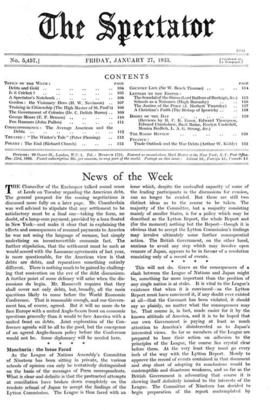News of the Week
MITE Chancellor of the Exchequer talked sound sense at Leeds on Tuesday regarding the American debt. The general prospect for the coming negotiations is discussed more fully on a later page. Mr. Chamberlain was well advised to stipulate that any settlement to be satisfactory must be a final one—taking the form, no doubt, of a lump-sum payment, provided by a loan floated in New York—and make it clear that in explaining the effects and consequences of resumed payments to America he was not using the language of menace, but simply underlining an incontrovertible economic fact. The further stipulation, that the settlement must be such as would accord with the Lausanne agreements of last year, is more questionable, for the American view is that debts are debts, and reparations something entirely different. There is nothing much to be gained by challeng- ing that contention on the eve of the debt discussions. A further point of some delicacy will arise when the dis- cussions do begin. Mr. Roosevelt requires that they shall cover not only debts, but, broadly, all the main questions • likely to come before the World Economic Conference. That is reasonable enough, and our Govern- ment has, of course, agreed. But it will no more do to face Europe with a united Anglo-Saxon front on economic questions generally than it would to face America with a united front on debts. Joint exploration of the Con- ference agenda will be all to the good, but the emergence of an agreed Anglo-Saxon policy before the Conference would not be. Some diplomacy will be needed here.
* * * *






































